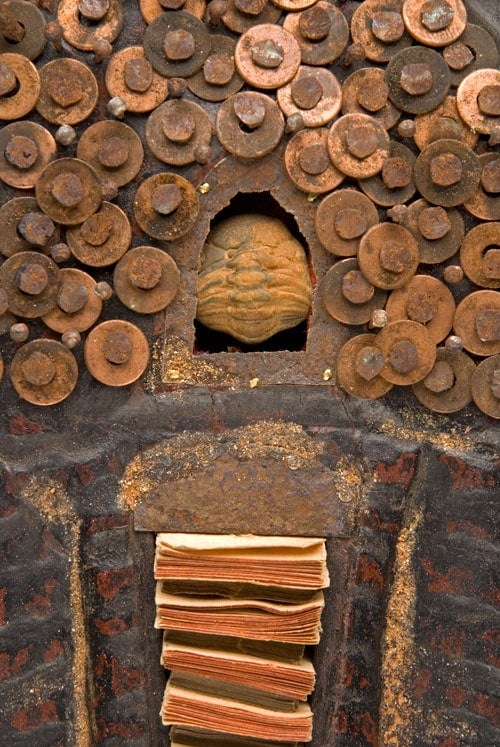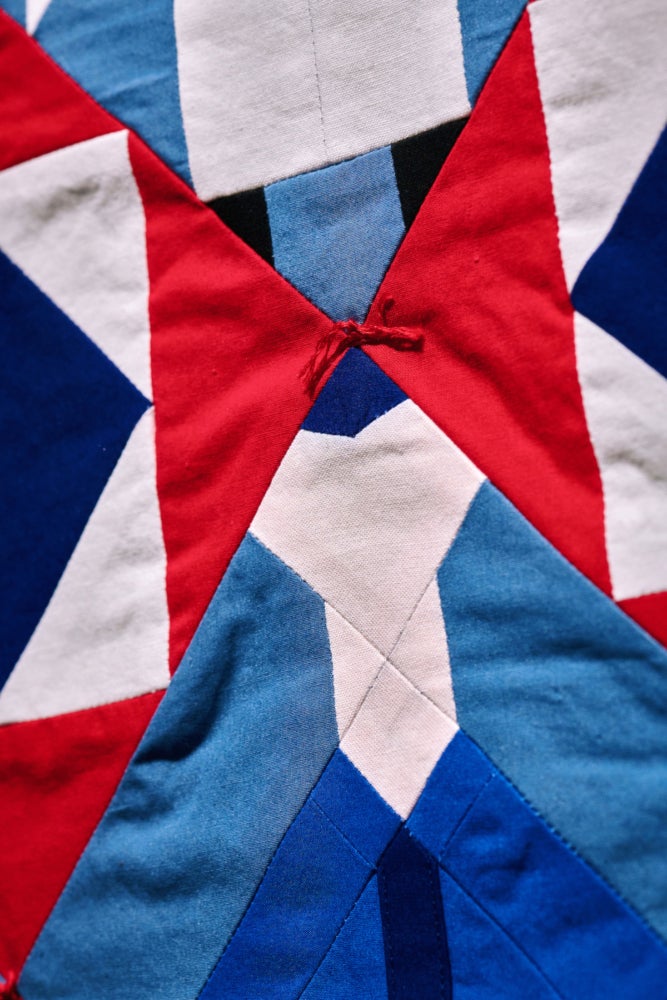
Black textile artists have finally begun to garner the recognition they deserve in the American art landscape. It’s important to note that, as an artistic genre primarily pursued in the United States by women and femmes (including many people of color), it should surprise absolutely no one that it has taken this long for the white male-dominated contemporary art industry to accept that textile and other forms of folk art belong in the same space and breath as other disciplines, like portraiture and expressionism. From Bisa Butler’s illustrious quilts to the delicate dye-work of Ambrose Rhapsody Murray, the contemporary art landscape is experiencing a resurgence in appreciation for art beyond the canvas and the camera. All of these important themes are explored in-depth by Raleigh-based artist, Precious D. Lovell, in her latest solo exhibition Ex-Domestication on view at Anchorlight in Raleigh’s historically Black neighborhood, South Park.
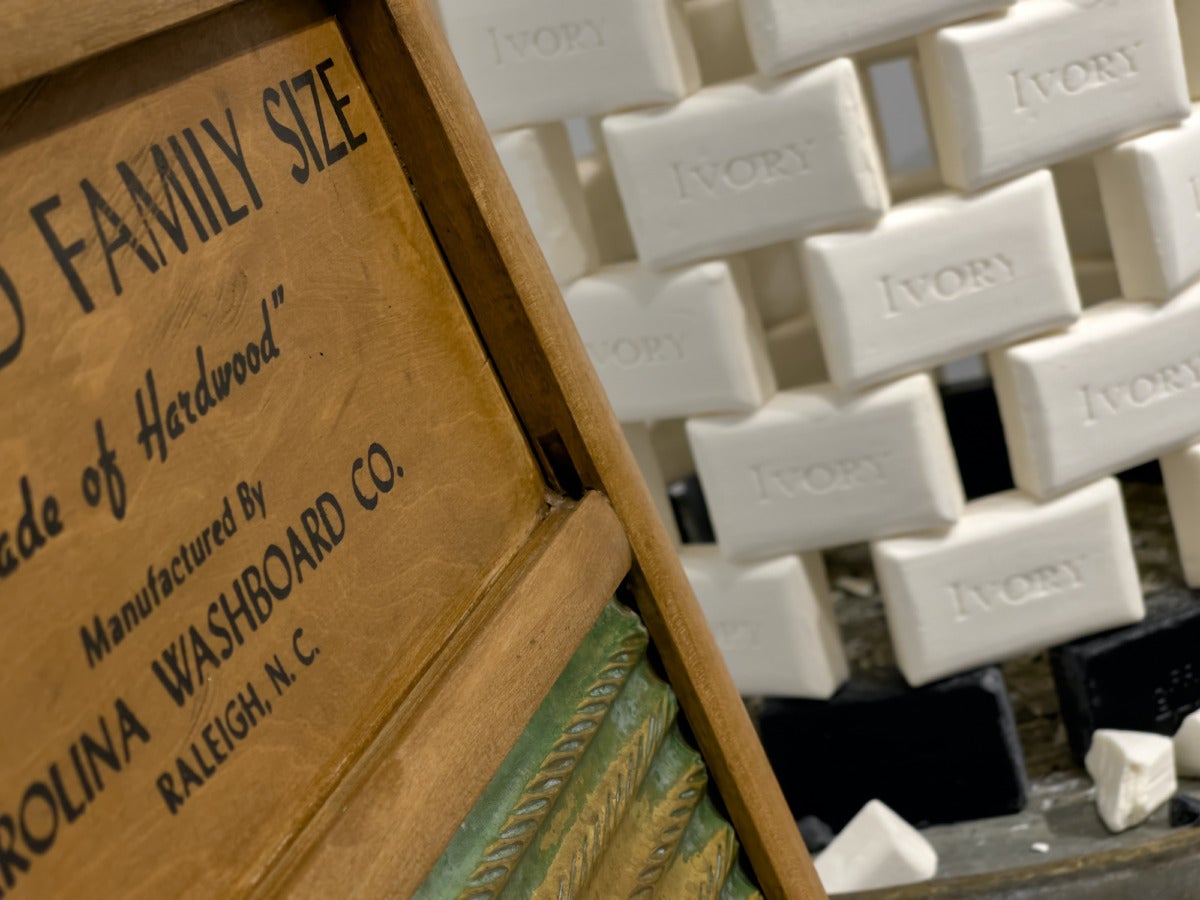
I met with Lovell in Anchorlight’s main gallery on an unseasonably warm February evening to discuss Ex-Domestication, the final project created from her participation in their Brightwork Fellowship. The intimate conversation began with Lovell explaining the origin of her love of the “domestic arts,” which was born through the observation of, and education by, the matriarchs of her childhood in rural North Carolina. Her great-grandmother’s patience taught her to sew, while her mother’s exacting guidance taught her to sew excellently. Both their artistry and the desire for excellence revealed a particular strength and self-knowledge within the women who raised Lovell that she saw reflected in herself. Their standards did not end at the needle, either, but persisted in the segregated community they resided in. Lovell comes from proud people, a quality reflected in everything they touched and everywhere they went. In our conversation, she recalled her older cousins walking out of high school to protest the school mascot the “Rebel” represented by a confederate soldier and the confederate flag, as well as the community activism that took place at her family’s church..
The dignity of Black American women, and the people they love, is a central theme of Ex-Domestication. One of the most explicit pronouncements of this comes from the unique installation piece, Babylon is Falling. Bars of Ivory soap are stacked atop a foundation of African Black Soap with an up-turned vintage wash-tub pedestal. To the left of the tower is a vintage washboard, antebellum surveillance device called a Tattle-Tale Iron. The contraption is a traditional one-piece iron with a bell attached to the handle. So long as the enslaved women would use the Tattle-Tale Iron, the attached bell would ring, causing the briefest pause to alert her prowling mistress. To the right of the tower hangs a dish towel screen printed with the image of a singing, cleaning Black mammy figure surrounded by the tools of her labor. However, Lovell does not recreate or contribute to the faithful servant archetype, instead the artist reconfigures the mammy figure so that she is self-possessed, delicately painting a revolver sticking out of the mop bucket, a spear leaning against a mop, surrounding her with embroidered words of liberate her from the cage of caricature:
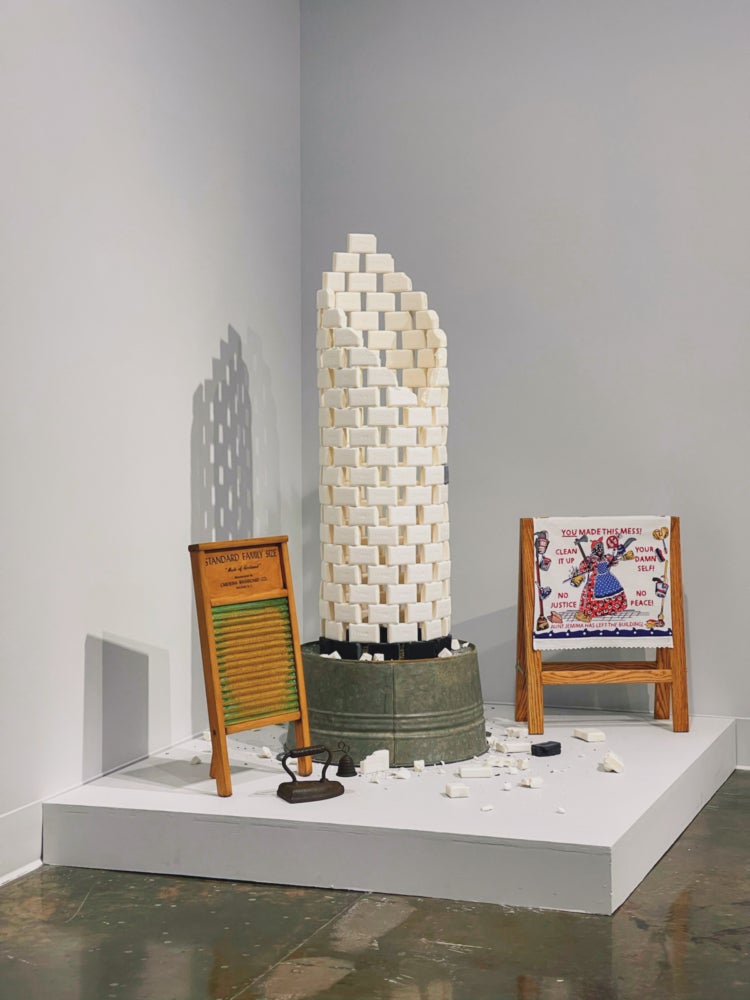
“YOU MADE THIS MESS!”
“CLEAN IT UP YOUR DAMN SELF”
“NO JUSTICE NO PEACE!”
“AUNT JEMIMA HAS LEFT THE BUILDING!”
The reconfiguration is not just Lovell’s fantasy, but an important correction of our historical narrative. The revolver represents the one Harriet Tubman—civil rights activist, nurse, Civil War spy, and suffragist—carried in the folds of her skirts as she led hundreds to freedom. The conch shell resting beside the broom was a weapon used by the enslaved in the Caribbean. The dignifying phrases that surround the empowered figure have flowed from the mouths of Black women all over the world for over two centuries, crescendoing in the twenty-first century with a seismic force that gave rise to movements like Black Lives Matter, #MeToo, the 2017 Women’s March, and the 2020 protests in response to police brutality against Black civilians.
One of the great appeals of textile-based art at large, and Ex-Domestication, specifically, is the soft familiarity of the materials themselves. Walking into the gallery is akin to seeing a mirage — the mind recognizes the white quilts, aprons, and pillowcases adorned with patriotic reds and blues with familiar symbols of comfort, yet the soul stands alert to the deeper truth held in the embroidery, crochet, and embellishments.
A quintessential representation of this sensation is Quotidian. The white cotton handkerchief, a staple of the Black Southern matriarch, is embroidered with the title “BLACK MOTHER’S LAMENT,” then a list follows:
CHOIR REHEARSAL
EATING ICE CREAM
PLAYING VIDEO GAMES
REQUESTING HELP
GROCERY SHOPPING
“I have wanted to do a piece like this for a while,” Lovell explained. “After the shooting in Buffalo, I realized that I refused to allow anyone to go unnamed, and so I listed the mundane activities during which we have lost our people and our lives because of white supremacy.” Then Lovell attached a single glass bead to the handkerchief, a memorial to the infinite tears of grieving Black mothers soaked in similar cotton fibers.
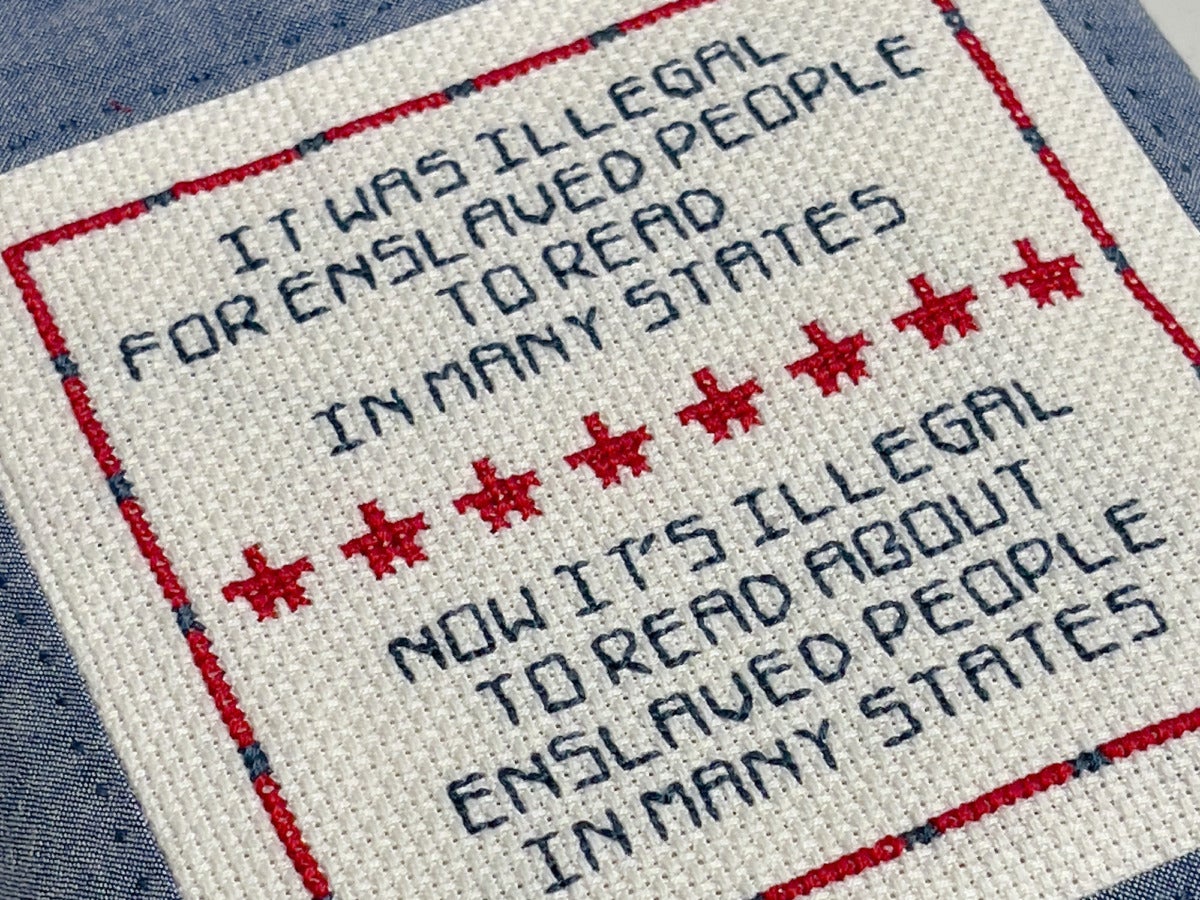
While white supremacy wants the world to believe that only “modern” Black women—like the founders of Black Lives Matter, Jemele Hill, Bree Newsome Bass, or Kimberlé Crenshaw—are unsatisfied with their societal cages and the narrative of white supremacist system’s construction (the emotional policing experienced by Jada Pinkett, Angela Bassett, and champion college basketball player Angel Reese all come to mind), the truth is that women across the African diaspora have been protesting physical enslavement and residual oppression since our enslaved ancestors tossed their babies over the sides of slave ships and raised weapons against their intended enslavers. Their resistance against the cruelty of white supremacy lived in every stitch, every meal, every drop of a mother’s milk into the mouths of future owners, and every garment forced across the washboard. The innovation of Black culture in the midst of white supremacy has embedded into our psyches that the work of our hands is also a radical statement of our humanity, our intellect, and our liberated souls. Lovell’s groundbreaking exhibition tells us that the Black woman’s song (whether sung, sown, or stitched) is always an oath to freedom, to ourselves, to the earth, and to the nourishment of future generations.
The closing reception for Ex-Domestication takes place on April 15 from 4-7PM at Anchorlight in Raleigh, North Carolina. Ex-Domestication, an exhibition by Brightwork Fellow Precious D. Lovell is on view through April 15, 2023.

